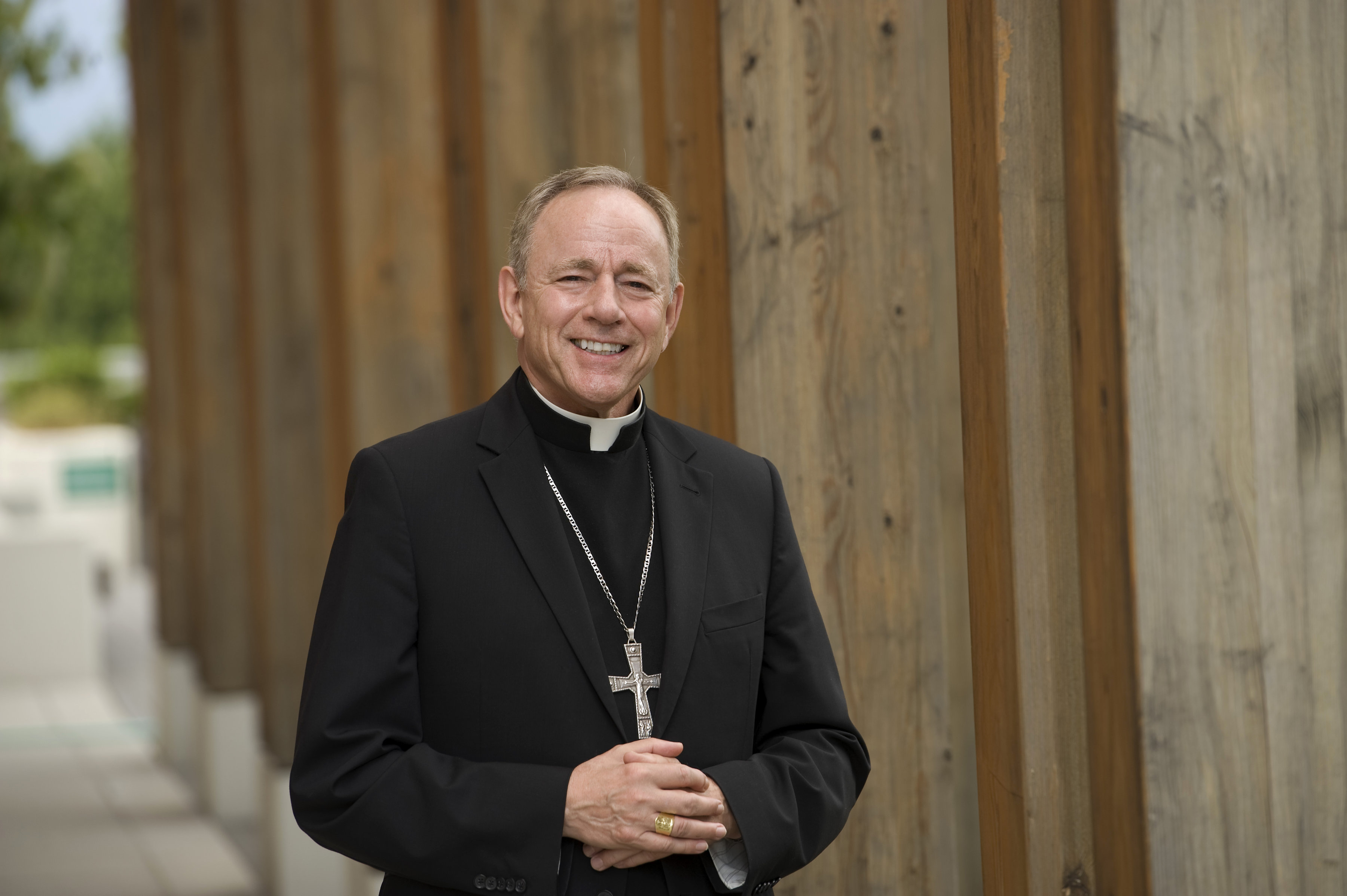
An excerpt from a homily for the 2017 Light of Jesus Kerygma Grand Feast by Archbishop J. Michael Miller, CSB
- Don’t Be Ashamed of Your Own Weakness
A big stumbling block for many people is their sense of their own unworthiness, perhaps even of being a little hypocritical, in talking to others about Jesus when they are aware of their own sinfulness. Pope Francis offers us some good advice on this score:
Our falling short of perfection should be no excuse; on the contrary, mission is a constant stimulus not to remain mired in mediocrity but to continue growing. The witness of faith that each Christian is called to offer leads us to say with Saint Paul: “Not that I have already obtained this, or am already perfect; but I press on to make it my own, because Christ Jesus has made me his own” (Phil 3:12-13).[1]
- Keep It Simple
First of all, keep it simple. Always remember the heart of Jesus’ message, the kerygma, the core of the Gospel, which is the “proclamation of God’s love, mercy and forgiveness, revealed to us in the life, death and resurrection of Jesus Christ.”[2] Tell others who are wounded and may not even know what or for whom they are searching “Jesus Christ loves you; he gave his life to save you; and now he is living at your side every day to enlighten, strengthen and free you.”[3]
Why this simplicity? Because “at times we lose people because they don’t understand what we are saying, because we have forgotten the language of simplicity”[4] and we use terms that are foreign to people.
- Don’t Start with Moral Teaching
Second, don’t first bring up the so-called “hot button moral questions. These are important, but they make sense only in light of what is truly primary: the person’s encounter with the mercy of the living Christ.
The Pope regrets that, because of the media attention given to a handful of moral questions, the heart of the Gospel risks becoming obscured. What happens, he says, is that “certain issues which are part of the Church’s moral teaching are taken out of the context which gives them their meaning. . . . [rather] the message has to concentrate on the essentials, on what is most beautiful, most grand, most appealing and at the same time most necessary.”[5] Before someone can understand and live the Church’s moral teachings, that person must first grasp that he or she is gazed upon and loved by a merciful God.
- Talk As a Friend to Friend
The invitation to believe in the Gospel is always personal: it is not first of all a program for moral improvement or a happy life but the offer of communion with a person, Jesus. “Heart speaks to heart,” as Cardinal John Henry Newman put it. Your invitation will be effective if you are a joyful disciple. The evangelist presents the challenges of the Gospel not as the word of a superior to an inferior, but of a friend to a friend. Relationships are key to this whole process. Prepare the ground by first establishing trust, and then offer accompaniment to the person along the challenging road to life in Christ.[6]
Good Habits of Missionary Disciples
In conclusion, I want to suggest some tips that might help you to be effective missionary disciples. I call these the “good habits” that we should develop to be the Lord’s good servants. We all need to take on certain dispositions of mind and heart if we are to become the mission-oriented Church which God wants. The following good habits are particularly crucial to the cultural change we are seeking to effect in the Archdiocese.
- Meditation of Scripture
Listening and responding to God’s word in the Sacred Scriptures must be at the heart of our efforts to live and spread the Gospel. One who is in love desires to know more and more about the beloved. Since all Scripture speaks of Christ, immersing ourselves in the Word is a way to deepen our initial encounter and grow in our relationship with him.
God’s word is “living and active” (Heb 4:12); it renews our minds and changes us. The more grounded we are in Scripture, the more we are able to understand God’s marvellous plan and to see the events in our lives with the eyes of faith.
Through Scripture we learn to hear God speaking to us personally: “In the sacred books, the Father who is in heaven meets His children with great love and speaks with them.”[7] As God’s word is dynamic, so must our response be: we take the word to heart and apply it to our lives.
- Eucharist
In the Holy Eucharist we reach the summit of our participation in the victory of Christ over sin and death: the triumph we proclaim in the new evangelization. In this Most Blessed Sacrament we have the source of our zeal and strength to unleash the power of the Gospel.[8]
Our evangelizing activity leads ourselves and others to the Eucharist, since the Eucharist is the fullness of communion with Jesus and his whole Church. On the other hand, the Eucharist leads us to evangelize, since our ability to announce the Gospel springs from the Passion and Resurrection of Christ which is made present anew in the Eucharist.
At every Mass the Church – that is, all her members – are newly empowered and sent forth to bring Christ into the world. Through the Eucharist we are nourished with Christ’s own self-giving love so that we can reproduce that love in our own lives. Thus the goal of the liturgy is never just to receive the sacrament and go home; it is to become a living tabernacle through which Christ is made present to others.[9]
- Docility to the Spirit
First, be docile to the Spirit. Throughout the Acts of the Apostles it is evident that the Holy Spirit was the initiator, guide, and driving force of the Church’s evangelizing mission (cf. Acts 4:31; 8:26-29, 39-40; 10:19;13:1-13l 15:28; 16:6-10).
After giving his disciples the Great Commission, Jesus told them to “stay in the city until you are clothed with power from on high” (Lk 24:49). As the first evangelization could not have taken place without the coming of the Spirit at Pentecost, so the new evangelization cannot be accomplished without a new Pentecost.
So today the new evangelization can only be carried out through a radical openness to the leading of the Spirit: preceding every initiative with prayer for his guidance, constantly allowing ourselves to be led by him, and obeying his promptings and inspirations.
- Apostolic Boldness
A second quality that stood out among the early Christians was their boldness in proclaiming the Gospel, even in the face of hostility and persecution (cf. Acts 4:29, 31; 28:31). They did not hesitate to proclaim Jesus as the one Saviour whom God offers to the whole human race, and to call their listeners to repentance and conversion. Their boldness was not a human personality trait, but a result of their intimate union with Christ (cf. Acts 4:13).
- Spirit of Innovation
A third habit to acquire is understanding that the rapidly changing cultural situation in which we find ourselves requires that we think in new and creative ways. We need to be willing to let go of some old structures that no longer work and to experiment with new ones. As St. Paul tried different missionary strategies in different settings (cf. 1 Cor 9:19-23), so we need to be innovative, flexible, adaptable, unafraid to make mistakes, and willing to learn from the good ideas of others.
- Spirit of Cooperation
Fourth, we must accept that there can be no competition in the Body of Christ – not between or within movements and parishes – because we have one Lord and we have one united purpose (Eph 4:1-6): to share God’s loving mercy and bring others to Jesus. Let’s always remember that any victory for one is a victory for all. As Christ’s Apostles had to put aside rivalry and learn to work as a team (Lk 9:46-48), so we are called to a spirit of generous cooperation and sharing of resources.
- Confidence in God
Lastly, we must hand over all our our plans and initiatives with utter confidence in God. We give the Lord the best of our effort, but it is he who will bring about the increase. We can trust in him, for the missionary renewal of the Archdiocese of Vancouver is not our doing but his divine work in which we are cooperating. “Therefore, neither the one who plants nor the one who waters is anything, but only God, who causes the growth” (1 Cor 3:7).
Conclusion
The book of Acts ends in chapter 28 with the Apostle Paul under house arrest in Rome, still boldly preaching the Gospel. St. Luke ends without finishing the story because the story of the Church’s mission continues in every age. We are living the 29th chapter of Acts! The power unleashed by the Holy Spirit evident in the ancient world is still at work in the Church of Vancouver today. “Every Christian is challenged, here and now, to be actively engaged in evangelization.”[10] Enkindled by the fire of the Spirit, go and become missionary disciples to the world around you!
+ J. Michael Miller, CSB
Archbishop of Vancouver
Find More of Archbishop’s Homilies
